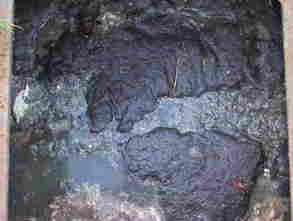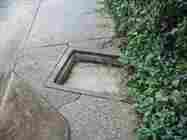Septic Tank Emptying, Cesspit Cleaning
Septic Tank Emptying
WTE Ltd. does not empty septic tanks, but here is some information that will help you to understand why they need emptying and how it should be done.
You must only use Licensed Waste Disposal Companies to empty a septic tank or sewage treatment.
Septic tank Systems tend to be ignored until the system backs-up or starts to smell. In spite of the recurrent advice of manufacturers to empty them at regular intervals and to be careful what is flushed down the drains,they tend  to remain ignored - until it is TOO LATE.
to remain ignored - until it is TOO LATE.
Septic tanks require emptying so that they can be monitored and any problems can be fixed at an early stage. Once the problem becomes deep rooted, loads of money and labour are required to fix the problems - sometimes incurable if extra land is not available for a new soakaway.
A well designed septic tank has enough space to store sludge for one year, if it it used up to its design loading criteria, e.g. a 6 person tank being used by 6 people, but the frequency of septic tank emptying depends on the Capacity of the tank and the Volume of solids in the wastewater.
Capacity
The Septic Tank capacity is worked out as follows:-
C = 180P + 2000
- 180 = litres/person/day
- C = Capacity of the septic tank
- P = the number of people using it
From the above, 4 people would need one of 180 x 4 + 2000 = 2720 Litres. This would need to be emptied annually if 4 people were using it.
However, if it was twice the size, i.e. 5440 litres, then it would need to be emptied only once every 2 years.
Similarly, if the 2720 litre tank was used by only 2 people, then it would also need to be emptied only once every 2 years; by 1 person, then every 4 years, etc.
Volume of solids in the wastewater
 Type and frequency of activities determine the septic tank emptying interval. Fats, oils and greases (FOG) tend to build up in the crust on the top of the effluent. If FOG's are excessive, then it will require more frequent emptying to prevent them from by-passing the 'T' outlet pipe and clogging the soakaway. Grease traps should be installed and cleaned out on a regular basis to ensure proper functioning of the system.
Type and frequency of activities determine the septic tank emptying interval. Fats, oils and greases (FOG) tend to build up in the crust on the top of the effluent. If FOG's are excessive, then it will require more frequent emptying to prevent them from by-passing the 'T' outlet pipe and clogging the soakaway. Grease traps should be installed and cleaned out on a regular basis to ensure proper functioning of the system.
The installation of sink waste disposal units dramatically increases the solids in the wastewater. This means that you will need a much larger septic tank and it also reduces the septic tank emptying interval. DON'T FIT ONE! Compost it instead. Maintenance will increase and you will need septic tank emptying twice as often if one is fitted. Moreover, biological and chemical additives do not get rid of the need for tankering.
As the saying goes a stitch in time saves nine. So why not mark the problem areas and pay attention to sewage odours, sewage backing up into the house or over the drain field, slow-draining toilets or drains? For good Septic Tank Maintenance you can follow these few steps mentioned below:
- Septic Tanks should be emptied at the correct intervals for their capacity and number of 'bums on seats'
- Septic tank systems should be inspected for structural faults every year. Too many people have fallen into septic tanks when lids and tops have collapsed.
- Make sure that no rainwater empties into the septic tank and no gutters are joined to the system.
- Buy the septic tank from a reputable Wastewater Company with a Customer Service Department and a warranty of years, not months as is the case with many manufacturers. WTE specialise in Septic Tank Replacement.
- Repair faulty toilets and dripping taps.
- Make a map to learn the location of the system, particularly the soakaway.
- Keep a record of the maintenance and septic tank emptying.
- The best way to have a well maintained septic tank system is to seek professional help from those who specialise in the servicing of Domestic and Commercial sewage systems.
